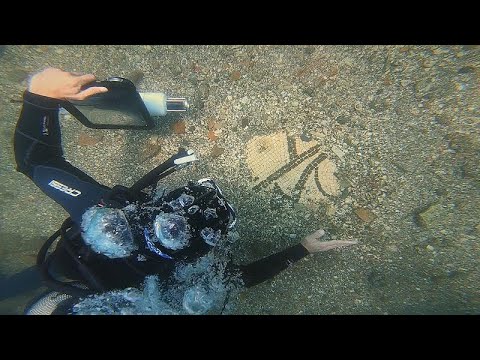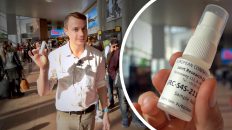The sunken ruins of ancient cities, the monuments of lost civilisations, may reappear before our eyes thanks to new technologies of augmented reality. Euronews’ Denis Loctier went to Italy for Futuris to investigate a remarkable new tool under development.
Two thousand years ago, a now-flooded coastal area near Naples was a fashionable Roman resort — Baia. Today, you have to dive to see the remains of the luxurious villas. And soon, to make your diving experience even better, you could take your tablet along.
“Thanks to this system, divers can know their position underwater, which normally isn’t possible as GPS signals don’t work under the surface,” says Associate Professor of virtual prototyping at the University of Calabria, Fabio Bruno.
The tablet, safely carried in a waterproof case, picks up acoustic signals from underwater beacons. This helps a special app to precisely position itself on a map, guiding the diver to the most interesting underwater sites — like a floor mosaic from a submerged Roman villa that would otherwise be hidden from view by sand…unless you know where to look.
“We can see on this tablet a map showing where we are, what can we see, and what the underwater ruins represent. And in addition to that, for the first time we made it possible to use augmented reality underwater,” explains Bruno.
The app, developed by the European research project iMARECULTURE, recreates the villa in 3D on the mobile screen, so the diver can travel through the virtual city while exploring its submerged ruins.
QR codes can be fixed to the seafloor to offer tourists an even more immersive experience. But can these Vitual Reality tools be used by non-divers?
“Many people can’t dive, can’t see these underwater relics, and can’t visit this site, so what we’re trying to do is using many different virtual reality tools to bring this information closer to the general public,” says Assistant Professor in photogrammetry, Cyprus University of Technology, and iMARECULTURE project coordinator Dimitrios Skarlatos.
At the local archeological museum, we can see how this 3D visit works on dry land. A stereo headset places the user in a realistic virtual world. You can explore the villas in their past splendour, or switch to the present and make a virtual dive among the ruins without getting your hair wet. This experience will be available at museums, schools or even at home.
“You can really walk through the objects that don’t exist anymore, you can hear stories about them, you can meet the characters from their history — you can give an immersive experience to the public, which is really priceless now, I think, and it’s not so expensive anymore,” says Professor of computer graphics at the University of Sarajevo, Selma Rizvic.
Beyond the popularisation of historical heritage, the virtual reality technologies allowed the researchers to develop a professional simulator that teaches proper excavation techniques at an underwater archeological site.
“We want not only to educate the general public, but we also want to provide a tool for future archeologists and museum curators, so that they can learn faster and easier, in a controlled environment. It would be very difficult to train someone if you had to actually take them to an underwater site, so with this technology, training will hopefully be more efficient,” concludes Associate Professor of VR and AR at Masaryk university, Fotios Liarokapis.





